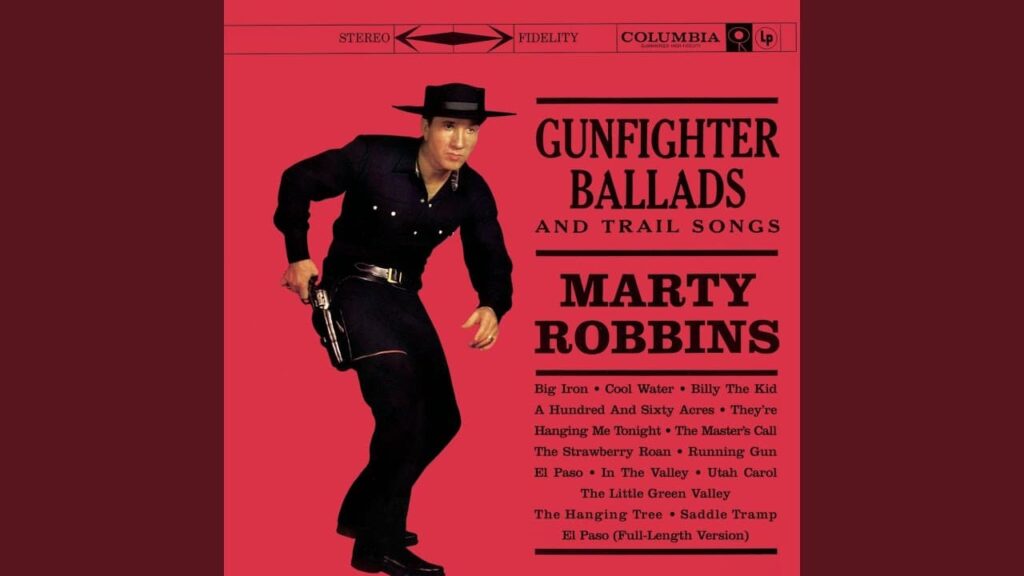
The Roaming Heart’s Lament: A Cowboy’s Ode to an Unfettered Life and its Lingering Costs
Marty Robbins‘ evocative and quintessential Western ballad, “Saddle Tramp”, is a shining example of his unparalleled ability to craft compelling narratives within the country and Western genre. Featured on his iconic 1959 concept album, “Gunfighter Ballads and Trail Songs”, this track, while not a standalone charting single in its own right, was a crucial component of an album that achieved monumental success. “Gunfighter Ballads and Trail Songs” soared to number 6 on the Billboard Top Pop Albums chart, solidifying Robbins‘ legendary status as the definitive voice of cowboy lore and frontier tales. “Saddle Tramp” contributed significantly to the album’s rich tapestry of characters and landscapes, offering a poignant look into the life of a wanderer and becoming a beloved deep cut for aficionados of authentic Western music. It’s these album tracks, often overlooked by casual listeners, that truly reveal the breadth and depth of an artist’s vision.
The story behind “Saddle Tramp” is a classic Western archetype, brought to life by Marty Robbins‘ singular songwriting talent. Robbins penned this vivid narrative, placing the listener squarely in the boots of a nomadic cowboy, a “saddle tramp” who has chosen a life of ceaseless movement over the comforts of a settled home and lasting relationships. The song delves into the internal conflict of such a life: the undeniable allure of freedom on the open range versus the quiet loneliness that inevitably accompanies it. It speaks to the personal sacrifices made for a life unbound by obligations, and the bittersweet acceptance of a path chosen, even if it leads to solitude. Robbins, known for his meticulous research into Western history and folklore, imbued these characters with an authenticity that made them feel less like creations and more like companions on a dusty trail.
The meaning of “Saddle Tramp” is a poignant exploration of the allure and the inherent loneliness of a life lived without roots or permanent attachments. It’s a song about the rugged independence of a cowboy who values his freedom above all else, yet subtly hints at the cost of such a choice. The lyrics convey a sense of acceptance, even pride, in the nomadic existence, but also a quiet undercurrent of longing for something more. The “saddle tramp” travels light, unburdened by possessions or commitments, yet his journey is also one of solitude. Lines like “A saddle tramp goes his own way / No one to tell him what to do or say” celebrate autonomy, while the implied lack of lasting human connection underscores the price of that freedom. It speaks to the universal human desire for self-determination, juxtaposed with the intrinsic need for companionship, ultimately portraying a life chosen, but not without its quiet, lingering regrets.
Marty Robbins‘ vocal performance on “Saddle Tramp” is perfectly suited to the song’s reflective and slightly melancholic tone. His rich, resonant baritone brings the character of the wanderer to life with an authentic sense of weary wisdom. He sings with a narrative clarity that makes every detail of the saddle tramp’s journey palpable, from the dusty trails to the quiet nights under the stars. The instrumentation, characteristic of the “Gunfighter Ballads” album, is sparse yet effective, featuring a classic Western guitar riff and subtle percussion that evoke the rhythm of a lonely ride across the plains. This minimalist approach allows Robbins‘ voice and the powerful narrative to remain the central focus, creating an immersive and compelling musical tableau. It’s a testament to his artistry that he could evoke such a profound sense of place and character with such seemingly simple elements.
Listening to “Saddle Tramp” today evokes a deep sense of nostalgia for a golden era of storytelling in music, when the American West was still a vibrant source of inspiration, and artists like Marty Robbins were its most eloquent troubadours. It transports us back to a time of rugged individualism and wide-open spaces, reminding us of the timeless allure of the open road and the complex emotions that accompany a life lived on one’s own terms. For those of us who grew up with Robbins‘ incredible voice and his tales of cowboys and outlaws, this song remains a cherished gem, a powerful and poignant reminder that even the freest spirits carry their own silent burdens, forever riding under the vast, indifferent sky.